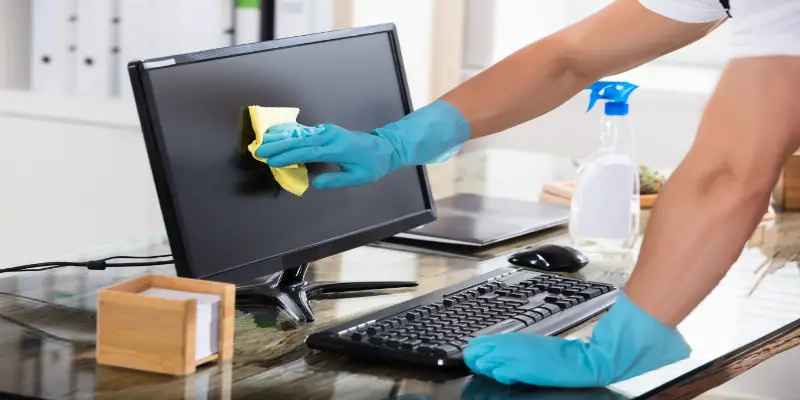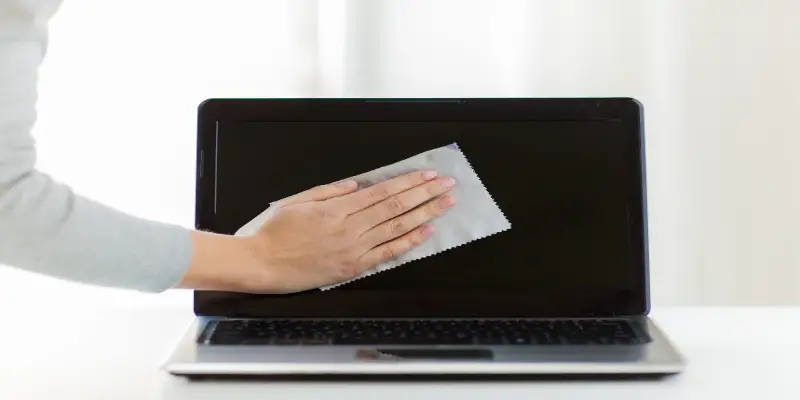Disclaimer: This post may contain affiliate links, meaning we get a small commission if you make a purchase through our links, at no cost to you. For more information, please visit our Disclaimer Page.
Screens are the most fragile and expensive parts of a computer, and also the most prone to dirt and germs.
One only requires a computer screen cleaning solution such as rubbing alcohol and a microfiber cloth to clean the screen. But the cleaner depends on the type of the screen, i.e., if LED LCD or non-LCD screen. Also, be careful not to use excessive moisture and abrasive cloth.
In this article, I discuss the best ways to clean and disinfect your computer screen to avoid damaging the screen. Read on to learn.
Table of Contents
Is It Dangerous To Clean A Computer Screen?
Even though it is a good idea to get rid of the dirt in your monitor, it is sometimes not safe. There are potential issues with using wipes that aren’t meant for cleaning computer screens. Below are the possible instances that may cause problems to your monitor:
- The wipes may contain components that leave a residue when the liquid dries up. For example, wipes used on human skin tend to have lotions, while those meant to clean household items contain some soaps, which leave streaks on the screen.
- If your screen is made of plastic, the wipes could contain chemicals that damage the screen.
- The wipes may not be lint-free, and you end up with the lint on the screen.
- The wipes may not contain the kind of chemicals needed to clean the screen properly.
- The wipes may contain too much liquid that is not sufficiently volatile. This liquid could then drip into the internal parts of the machine and cause damages. And may pose a danger to the person cleaning.
With all those instances posing a risk to the screen, you have to buy commercial computer screen cleaning materials to clean your computer screen.
Commercial computer screen cleaning wipes are typically a piece of non-woven lint-free moistened with a highly volatile liquid such as rubbing alcohol.
However, any lint-free cloth moistened with rubbing alcohol available in your cabinet will do an excellent job for you.
Also, the sort of pre-moistened wipes meant for cleaning eyeglasses, dry-erase boards, wipe windows tend to do a similar job as the ones used for cleaning computer screens.
Can You Use Alcohol Wipes On Computer Screens?
You can clean your screen with alcohol if it is made of plastic. However, it would be best if you watched out for the amount of moisture in the wipes. They tend to get wetter as you use them, but you can squeeze the liquid out until you remain with the proper amount of moisture. Also, watch out for the plastic that surrounds the screen.
Alcohol is a mild solvent; it is a less powerful solvent than water. But it has one advantage over water as alcohol can liquify grease and oil, which are the common causes of smears on the displays of electronic devices.
Don’t use pure alcohol to clean, though. A homemade mix of 7 parts of isopropyl alcohol and 3 parts of distilled water make the best cleaning agents of screens at home and are the cheapest and easiest to use.
Although alcohol might be a decent option to clean your screen, most new display screens have coatings that don’t react well with alcohol-based or ammonia-based detergents. Hence, in these instances, you should hold off using alcohol on your computer screen.
How To Clean A Computer Screen?
You are wondering how to clean your computer screen without causing any damages to it? Firstly, you don’t need to be a tech expert to understand that any liquid getting into the machine’s hardware means trouble. Hence, be careful not to let any liquid get behind the screen. Because of this, consider avoiding liquid sprays.
There are different types of screens, and depending on the screen, the cleaning options may vary. It is critical to clean your specific computer screen since the active components in cleaning products can cause irreversible harm in the form of scratches and streaks if done incorrectly.
I list some of the crucial tips that will help you clean your computer screen safely below:
- When cleaning, make sure to switch off your computer and display.
- Excessive wetness should be avoided, especially when cleaning near plugs and ports.
- Avoid using abrasive or rough material. Use a soft, lint-free microfiber cloth.
- Don’t spray the solution directly onto the computer screen; Instead, spritz it onto a cloth and wipe clean the computer screen with the cloth.
- Be cautious with the type of screen you have. If you aren’t sure, refer to the manufacturer of your machine for the guidelines for cleaning.
There’s more info on how to clean the type of computer screen below.
Can You Use Water And Soap?
If you have a computer with an LCD screen, you should avoid using disinfecting wipes as the active ingredients available in Clorox and Lysol wipes could damage the screen.
Chemicals or any solution containing acetone, ammonia, ethyl alcohol, ethyl acid, toluene, or methyl chloride can damage your computer screen. It’s best to avoid these kinds of cleaners as they may leave a glare-causing film.
Don’t bother using soap as well. Some soap varieties have ingredients that are known to affect LCD screens. A dry, non-abrasive microfiber cloth should do a better job.
Mac Vs. PC Screens
There are several factors to consider while cleaning a PC or a Mac screen. There are many computer and monitor models from which to choose. However, displays are often either LED with LCD (liquid-crystal display) pixels or a Non-LCD glass-coated surface.
Cleaning chemicals are more likely to harm LCD screens. But because people commonly clean PCs, there are prodycrs developed to safely clean them. Be careful not to damage its surface or any of the LED elements and make sure to read the ingredients of the formula to ensure it’s right for your screen.
Any ammonia-containing cleaning solutions would leave a coating on the screen. As a result, using cleansers free of ammonia, alcohol, and acetone to clean an LCD screen is both safe and effective.
Most Mac screens are glass-coated, and they can be cleaned with glass cleaners such as Windex or a microfiber cloth dampened with rubbing alcohol.
How To Clean A Non-LCD Computer Screen
- Turn off and unplug your computer.
- Using a dry microfiber, remove the dust off the screen.
- Spray isopropyl alcohol onto the cloth, or use a pre-moistened alcohol wipe such as Clorox Disinfecting Wipes to remove fingerprints and smudges.
- Wipe away any extra moisture from the computer screen’s surface.
- Allow the screen to dry naturally.
- Remove any remaining stains with a microfiber cloth.
How To Clean An LCD Computer Screen
- Turn off and unplug your computer.
- Dust particles may be removed using a dry microfiber cloth.
- To remove stains, spritz an LCD cleaner onto a microfiber cloth; an inexpensive DIY alternative is distilled water and white vinegar mixed together in a 1:1 ratio. No cleaning alcohol should be used since it can harm the LCD screen!
- Wipe the surface completely, but avoid getting any on the screen’s edges.
- Allow the screen to dry naturally.
- If any remaining streaks remain, rub them away with a dry microfiber cloth.
How Often Should You Clean Your Computer Screen?
Your desk at the office is not the most hygienic place, and because of this, computer screens, keyboards, and mice come into contact with germs, microbes, and bacteria, and they need regular cleaning.
Your computer screen requires cleaning at the end of every week. However, you can clean it at any time of the day before the weekends. This will ensure that computer screens are always clean.
Conclusion
Computer screens accumulate smudges and scratches all the time; thus, it is necessary to clean them regularly. Some cleaners are designed to clean screens and are available in online stores and computer stores. However, be careful to check the products to ensure that they don’t have active ingredients that can damage your screen.
If you have no knowledge about your computer screen type, you should refer to the user’s manual or reach out to your device’s manufacturer for assistance. You can contact them through email or on-site support chats.


